It might sound a bit like Jack and the Beanstalk, but some gardeners talk about planting eggs in their garden, especially for their tomato plants. The idea is that as the eggs decompose, they add much-needed nutrients to the ground, helping to ensure healthy plants. But does it work?
This is fairly easy to do, all it takes is placing a raw egg in the bottom of the hole you dig or putting it in the bottom of your pot, on top of a thin layer of soil. Some people break the egg, but most don’t bother. Either way, the egg is going to decompose, returning nutrients back to the soil. Another option is to put an egg and a banana together in the hole, adding even more nutrients to the soil.
Any gardener will tell you that the soil is the most important part of any garden, and what makes the soil important is the nutrients that it holds. Plants leech the nutrients out of the soil through their roots, absorbing them and using them as the basic building blocks to form new cells. If the soil doesn’t have enough of the right sorts of nutrients, it stunts plant growth and reduces the amount of produce that your garden can produce.
This is why gardeners spend so much time and money on fertilizing their gardens. But most commercial fertilizers provide only the three macronutrients of nitrogen, potassium and phosphorous. Serious gardeners augment this by composting, as well as using other fertilizers, like fish emulsion, bone meal and blood meal. These decompose to provide a much more complete diet for the plants.
What Do Eggs Provide?
So what about eggs? What do they provide? Adding eggs to your garden provides calcium, an important micronutrient. Calcium in humans and animals is important for bone formation. In plants, it is important for the formation of cell walls. Plants can’t grow without enough calcium in the soil.
But calcium is only found in the eggshells, not the inside of the eggs. The inside of the eggs will add other nutrients, but only a small amount. The big benefit comes from the shells.
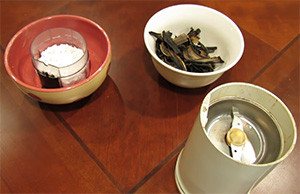
Something similar happens with bananas. People add those to put potassium into the soil; and the potassium is found in the banana peel, not the fruit inside. You can accomplish just as much, planting a banana peel, as you can a whole banana.
Actually, you can do much better to chop up the eggshells and banana peels, either with a blender or a food processor, adding them directly to the soil or to your compost pile.
Grinding them up helps them to decompose more rapidly, getting the nutrients into the soil and from there into the plants that much faster.
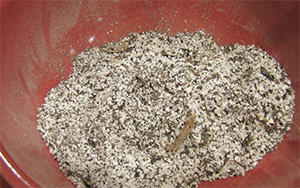
Doing it this way, you get to eat the eggs and the bananas, giving the part you don’t eat to your garden. That’s a double win for you, and helps convert the parts you can’t eat into usable food.
Since the nutrients from the eggshells and banana peels end up being used by the plants in your garden, at least some of them will end up in the fruit and vegetables that your garden produces.
The other advantage of doing it this way is that you don’t have eggs rotting in your garden. Rotten eggs don’t produce a very enjoyable fragrance. While that won’t hurt your plants any, it might hurt your nose when you are working in the garden.
It’s also going to attract raccoons and rodents to your garden, which will see those rotten eggs as a source of food, digging up your garden to eat them.
Related: How To Make a Mini Root Cellar In Your Backyard In Less Than Two Hours
Another Use for Eggshells
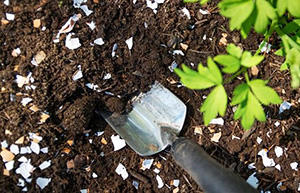 There’s more that you can do with eggshells; use them to protect your plants. Crushed eggshells, not ground up eggshells are a great protection for your plants, keeping slugs away from them.
There’s more that you can do with eggshells; use them to protect your plants. Crushed eggshells, not ground up eggshells are a great protection for your plants, keeping slugs away from them.
All you need to do is crush dry eggshells with your fingers and put the small crushed pieces around the base of your plants.
Those sharp edges will work as a major deterrent to the slugs, which can get cut by them. It will probably do a pretty good job protecting your plants from caterpillars as well.
Lots of Other Additives
It’s simple; if you want a healthy garden, which provides you with a great harvest, you’re going to have to spend time on the soil. Eggshells are a great start for this; but there are a lot of other things you can do to improve the quality of your soil.
To start with, it’s always a great idea to be composting. You are not going to be eating everything that comes out of your garden; there will always be cuttings, scraps, weeds other scraps. In addition, you’ll have table scraps that aren’t used. All of these break down naturally, providing nutrients to put back into the soil. By composting, you’re actually doing what happens in nature, recycling those nutrients.
Compost can be added to your garden anytime, but the best time to add it is in the fall, when you finish your harvest. That allows the nutrients the whole winter to work their way into the garden’s soil. Granted, the colder weather will slow the decomposition process, but the water from the melting snow will help the nutrients soak in.
The pH of the garden soil is important for growth as well. Some plants need slightly acidic soil, even though most require a neutral pH. Adding either ash from the fireplace (or wood-burning grille) is a great way to boost the pH. One of the best soil additives I’ve found for gardening is mycorrhizal fungi. These subterraneous fungi attaches itself to the roots of plants, forming a symbiotic relationship with the plant.
The fungi acts as an extension to the plant’s roots, bringing nutrients to them, while feeding off the roots of the plants. Adding this fungi to your garden can do amazing things to increasing the yield you get from your plants. It is also a great addition where roots are short and plants aren’t getting enough nutrients.
I had a burned over area of lawn once, which wouldn’t grow back for two years, until I added mycorrhizal fungi. Once the fungi took hold, the grass was growing and green again, within two months.
You may also like:
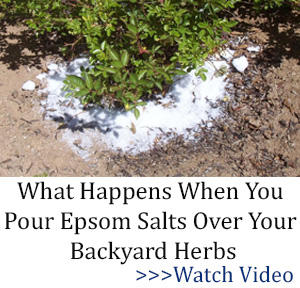 The Overlooked Gold Mine of Post-EMP Survival
The Overlooked Gold Mine of Post-EMP Survival
Engineers Call This The “Solar Panel Killer” (Video)













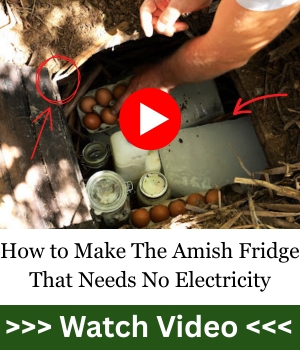

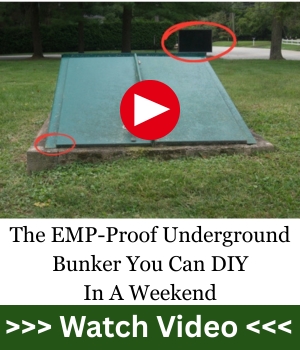






I never thought about using an egg or a banana under my tomato plants. …………….Now that I have, I believe I’ll pass. I’ll continue to eat my eggs and bananas, then put the shells and peals on the compost pile.
The Calcium from egg shells is a great idea. However, a much broader impact for soil nutrition can come from adding rock powers to the soil. These powders, such as AZOmite contain the micro nutrients that the plants need. If the soil addition does not have the needed micro nutrients, then that benefit is not going to be available either. Use rock powders, these will have more of the needed micro-nutrients that plants need.
For years I have been using crushed egg shells and chopped up banana peals in my raise beds. I also ,in ground, compost most kitchen waste. The earthworms love it, and it puts the material to immediate use rather a year later. “In ground” composting is just bury the organic scraps between plants and rows. In one bed I have volunteer potatoes that started from potato peels. Since they start super early I plant around them and we have little, thumb, size for several meals and then compost the tops. Next year the little tiny potatoes will sprout again.
Hey Graywolf 12, You get potatoes from peals?!? That is great! THANK YOU for sharing that!
There ya go, AAP readers; potatoes from potato peals, and you heard it from Grawolf 12 !
Well, Hoosier, there goes your little dig at Graywolf. Claude corrected his incorrect homonym.
That is OK. He will miss type some day and I’ll repay him for his courtesy. See the answer I sent to him. I took his immature age into account when I read his comment.
Stop being mean, you know good and well that he meant Peels…. I choose to believe he can, because all of us know we cut the eyes out with just a bit of potato ….Maybe his peels are thick cut…
My wife peals deep, and if there is a sprout on it she doesn’t break it off.
This has been part of our process for years.
It works like a champ, like a little self-contained, time-released super boost.
We have composted directly in the ground since I was a kid, now north of 60, but we used the biblical letting the “land go fallow”. Just wondering, would adding the whole egg increase the sulfur content in the soil?
I thought fertilizer had been invented for a reason?
Sorontar, fertilizer is not as nutritious as this type of waste. It also provides for the other things like worms, to exist in the food chain. I would rather have food using “Natural” sources than chemicals.
The constant use of fertilizer wears the soil out and you end up with dirt and the need for the increased use of fertilizer. The compost keeps the soil healthy and adds fertility.
I have been making my own fertilizer for years. I use banana peels, egg shells and coffee grounds. Great for my plants and saves me money.
Back East with acid soils, wood ashes raise the ph so that the soil is more neutral, not too acid and not too alkaline.They call it sweetening the soil. However in the West on the coast, we have neutral to alkaline soil. Adding wood ashes doesn’t do the boost the way it does back East. I tried wood ashes in my vegetable garden and created a dead zone, so it matters what pH your soil is to start with at the beginning to decide if you will or will not use wood ashes.
I don’t know if you are in NorCal or SoCal, but in SoCal, not only is most of the soil alkaline, but the water has a high alkaline content also. Water during the heat of the day so the water dries on the surface of the soil and you can see the salts as a whitish solid on the top of the soil. Coffee grounds are good for changing the ph of the soil.
Jan, I live in the southwest and found if you mix some used coffee grounds into the alkaline soil it helps by adding a natural form of acidic organic matter. Blue berries love it, but you have to be careful not to overdo or it will burn your plants. Moderation is key, add a little at a time over several months until you see the results you want.
When transplanting house plants I always use egg shells and used coffee grounds. I’m not sure what the coffee grounds do, but it works.
Jo, In Texas, I spread coffee grounds all over my yard. It’s great food for earthworms who flourish and are great for the yard in return.
I remember a film from high school biology that showed slugs gliding along the edges of razor blades, protected by the layer of slime they travel on.
Check out keyhole gardening in Africa on Youtube for origins of the keyhole garden. It started with villagers who had no access to good soil or fertilizer and who also had a limited supply of water learning how to utilize stones, trash, scrap metal, and grey water to create gardens that are a vital source of nutrition to people living on the edge. Amazing to think that billions of people around the world already live a post SHTF life.
Oh Rats! I hoped to get an eggplant!
My grandmother put crushed egg shells and coffee grounds in her garden. Same reason – adding nutrients.
I surmise that she removed the egg shell skin, didn’t she?
When I first bought this place I was digging in the soil and found a perfectly preserved egg. I am sure the insides were pretty much gone but it didn’t dissolve in the soil. I think the better idea is to grind the egg shells and put them in the soil.
it’s obvious, an egg plant wil grow lol
From the time the egg is buried how long do you wait to plant?
I added eggs deep into my garden this year and I regret that decision the most in my all decisions I have taken to date.
It attached animal pests that kept on digging into the soil, right next to the plant rootball in search of the protein smell!!
Terrible. All of my plants are injured of animals looking for their bounty. I dug them deep so the animals took multiple weeks to reach eggs! Destroyed my otherwise healthy crop. No decomposition has happened of these eggs. I dug out a couple And these were shell intact!
So don’t follow any garbage that’s written.
When you have drunk all the milk – save a tad in the container and rinse with water – use the milk water to your tomatoes as added calcium.
Southern California apartement dweller with almost zero growing space. Had to get creative and tie containers to the railing outside my bedroom window.
Got Kellogs soil from Home Depot, dug a hole, put rotten egg in it, cracked it then covered it with soil. Each pot has been transplanted a few times and each time, a new rotten egg is added. The soil is black and beautiful now!
Growing sweet potato vines now for greens. Hope they thrive in the black soil!